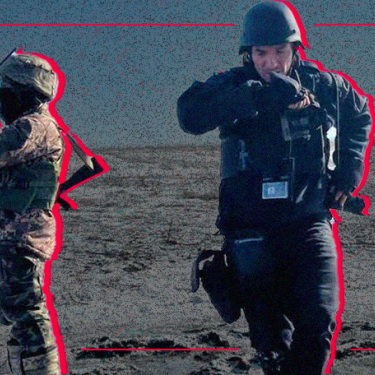Two years of war in Ukraine: RSF welcomes progress in journalists' access to the front line

On 6 February 2024, the Ukrainian authorities signed new legislative amendments improving journalists' access to combat zones as the country prepares to enter its third year of war. Reporters Without Borders (RSF) welcomes these decisions, which strengthen the right to information.
“RSF welcomes Ukraine's progress in improving access to information for journalists in war zones. The amendments signed on 6 February 2024 represent real progress for the right to information. Journalists now have greater scope to cover the Russian-led invasion of Ukraine, whose sad second anniversary of which will be commemorated on 24 February. As the Kremlin desperately tries to propagate its disinformation narrative about the war, the media in the country are playing a crucial role in reporting the situation on a daily basis.
The newly signed amendments improving media access to combat zones, which is regulated by the martial law introduced by the Ukrainian authorities when Russia invaded on 24 February 2022, had been requested for months by press freedom organisations, including RSF and its local partner, the Institute of Mass Information (IMI), which accused the authorities of imposing excessive restrictions on journalists working in Ukraine.
The amendments include the following improvements for press freedom:
● More zones are accessible to reporters. The zoning that regulates access to areas exposed to fighting has been relaxed. If escorted by a Ukrainian army representative, journalists can now visit so-called “red” zones near the front line from which they were previously barred. In the so-called “yellow” zones, the requirement to have a military escort now only applies to military sites, meaning reporters can henceforth access the same areas as civilians in general.
● The zoning system for combat regions has also been clarified. For the first time since it was established in March 2023, the authorities have published a transparent and detailed explanation of how it works.
● The duration of journalists’ accreditation has been extended from six to 12 months.
● Accreditation is henceforth available to bloggers, who will now be able to access areas at the front like professional journalists.
The authorities have also published an updated list of the categories of information that the media cannot disclose for security reasons, such as the Ukrainian army's combat plans, the locations of military units or the personal data of soldiers.
In 2022 and 2023, more than 12,000 Ukrainian and foreign journalists were accredited to cover Russia’s war in Ukraine. In a particularly dangerous security environment, the list of journalists who have been the victims of targeted Russian attacks has grown steadily longer.
